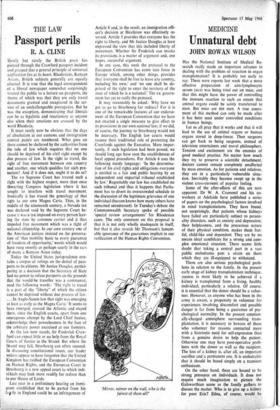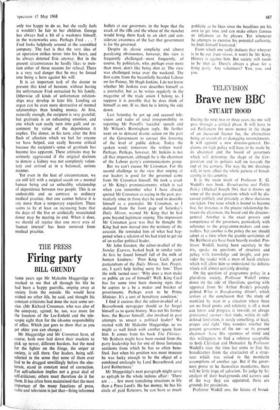Unnatural debt
MEDICINE JOHN ROWAN WILSON
Has the National Institute of Medical Re- search really made an important advance in dealing with the problem of rejection in organ transplantation? It is probably too early to say. There were reports last week that a more effective preparation of anti-lymphocytic serum (ALs) was being tried out on mice, and that this might have the power of controlling the immune reaction to such an extent that animal organs could be safely transferred to man. But mice are ribt men. A true assess- ment of this method can only be made after it has been used under controlled conditions in human beings.
Let us all pray that it works and that it will lead to the use of animal organs or human organs stored in deep-freeze. Then surgeons can get back to being surgeons, instead of television entertainers and moral philosophers. Tension and excitement are the enemies of good medical practice. No matter how much they try to preserve a scientific detachment, doctors cannot remain completely unaffected by mass emotion. As for patients and relatives, they are in a particularly vulnerable situa- tion. Inevitably they become swept up in the violent cross-currents of popular feeling.
Some of the after-effects of this are now apparent. Dr W. A. Cramond and his co- workers at Adelaide have published a series of papers on the psychological factors involved in renal transplantations. They have found, not surprisingly, that patients whose kidneys have failed are particularly subject to person- ality disorders, such as anxiety. and depression; their helplessness, and the precarious nature of their physical condition, makes them fret- ful, child-like and dependent. They are by no means ideal candidates for a strong and com- plex emotional situation. There seems little doubt that taking a central part in a vast public melodrama puts a strain on them which they are ill-equipped to withstand.
There are also serious psychological prob- lems in relation to the family. In the present early stage of kidney transplantation technique, success is most likely to be achieved if a kidney is transplanted from a living, healthy individual, particularly a relative. Of course, it is essential that the donor should be a volun- teer. However, as anyone who has been in the army is aware, a propensity to volunteer for experiences involving discomfort and possible danger is far from being a guarantee of psy- chological normality. In the present emotion- ally-charged atmosphere surrounding trans- plantation, it is necessary to beware of those who volunteer for reasons connected more with a histrionic need for self-expression than from a genuine desire to help the patient. Otherwise one may have post-operative prob- lems with the donor as well as the recipient. The loss of a kidney is, after all, an important sacrifice and a permanent one. It is undesirable that it should be based simply on a transient enthusiasm.
On the other hand, there are bound to be strong pressures on individuals. It does not require much imagination to picture the Galsworthian scene as the family gathers to discuss the matter. Who is to give up a kidney for poor Eric? Edna, of course, would be only too happy to do so, but she really feels it wouldn't be fair to her children. George has always had a bit of a weakness himself, in the waterworks area. Perhaps Fred . . . ? Fred looks helplessly around at the assembled company. The fact is that the very idea of an operation strikes terror into his heart, and he always detested Eric anyway. But in the present circumstances he hardly likes to men- tion either of those reasons for refusal. There is a very real danger that he may be forced into being a hero against his will.
It is an important task of the doctor to prevent this kind of heroism, without having the unfortunate Fred ostracised by his family. Otherwise all kinds of unfortunate relation- ships may develop in later life. Lending an organ can be even more destructive of normal relationships than lending money. At first, naturally enough, the recipient is very grateful; but gratitude is an exhausting emotion, and one which can easily turn into guilt and re- sentment by virtue of the dependence it implies. The donor, in his turn, after the first flush of affection which we feel for anyone we have helped, can easily become critical because the recipient's sense of gratitude has become less apparent. These attitudes may be seriously aggravated if the original decision to donate a kidney was not completely volun- tary and arrived at in a balanced, serious manner.
Yet even in the best of circumstances, we are still left with a surgical asault on a normal human being and an unhealthy relationship of dependence between two people. This is so undesirable and so contrary to ordinary medical practice, that one cannot believe it is any more than a temporary expedient. There seems to be at least an increasing hope that the days of the live or artificially resuscitated donor may be nearing its end. When it does, we should all rejoice that one more area of `human interest' has been removed from medical practice.







































 Previous page
Previous page